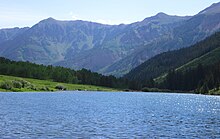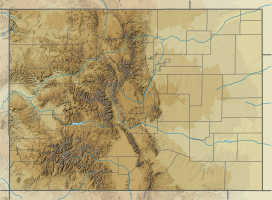Elk Mountains (Colorado)
This article has multiple issues. Please help improve it or discuss these issues on the talk page. (Learn how and when to remove these template messages)
|
| Elk Mountains | |
|---|---|
 The Maroon Bells, Elk Mountains. | |
| Highest point | |
| Peak | Castle Peak |
| Elevation | 14,265 ft (4,348 m) |
| Listing | Mountain ranges of Colorado |
| Coordinates | 39°00′35″N 106°51′14″W / 39.00972°N 106.85389°W |
| Geography | |
| Country | United States |
| State | Colorado |
| County | Pitkin, Gunnison and Eagle |
| Parent range | Rocky Mountains |
| Borders on | Sawatch Range and West Elk Mountains |

The Elk Mountains are a high, rugged mountain range in the Rocky Mountains of west-central Colorado in the United States. The mountains sit on the western side of the Continental Divide, largely in southern Pitkin and northern Gunnison counties, in the area southwest of Aspen, south of the Roaring Fork River valley, and east of the Crystal River. The range sits west of the Sawatch Range and northeast of the West Elk Mountains. Much of the range is located within the White River National Forest and the Gunnison National Forest, as well as the Maroon Bells-Snowmass Wilderness and Raggeds Wilderness. The Elk Mountains rise nearly 9,000 ft. above the Roaring Fork Valley to the north.
The highest peaks in the range are its fourteeners, Castle Peak (14,265 ft), Maroon Peak (14,156 ft), Capitol Peak (14,130 ft), Snowmass Mountain (14,092 ft), Pyramid Peak (14,018 ft), and North Maroon Peak (14,014 ft).[1] Maroon Peak and North Maroon Peak are collectively known as the Maroon Bells, a popular destination for recreation alpinism. Mount Sopris (12,953 ft) sits at the northwest end of the range and dominates the skyline of the lower Roaring Fork Valley and the town of Carbondale, Colorado, serving as an unofficial symbol of the area.

Additional notable peaks in the range include:
- Cathedral Peak, 13,943 ft (4,250 m), near Pyramid Peak
- Hagerman Peak, 13,841 ft (4,219 m), near Snowmass Mountain
- Snowmass Peak, 13,620 ft (4,151 m), near Hagerman Peak
- Clark Peak, 13,580 ft (4,139 m), near Capitol Peak
- Treasure Mountain, 13,528 ft (4,123 m), southwest of the Maroon Bells
- Mount Owen, 13,058 ft (3,980 m), high point of the Ruby Range
- Mount Sopris, 12,965 ft (3,952 m), north west of Capitol Peak
- Chair Mountain, 12,721 ft (3,877 m), high point of The Raggeds
- Crested Butte, 12,162 ft (3,706 m), home of Crested Butte Mountain Resort
- Whitehouse Mountain, 11,975 ft (3,650 m), northwest of Treasure Mountain
The range provides a formidable barrier to travel and is traversed only by backroad passes and trails, including Schofield Pass, Pearl Pass, and Taylor Pass. State Highway 133 traverses McClure Pass, at the western end of the range. The range has been the site of mining activity since the days of the Colorado Silver Boom, which saw the founding of mining towns such as Aspen and Ashcroft. In the late 19th century, the western and southern flank of the range became the site of intense coal mining activity which continues to the present day. Treasure Mountain, overlooking the town of Marble, is home to the famous Yule Marble Quarry. Quarried marble was used to create The Tomb of the Unknowns, the Lincoln Memorial, Denver Post Office and other buildings. The range receives a great deal of snowfall due to its position to the west of the continental divide and the westerly origin of many winter storms. This is exploited by the ski areas in the vicinity of Aspen, which are located on the flanks of smaller mountains alongside the Roaring Fork Valley.
Prominent peaks[edit]
| Rank | Mountain Peak | Subrange | Elevation | Prominence | Isolation |
|---|---|---|---|---|---|
| 1 | Castle Peak NGS | Elk Mountains | 14,279 feet 4352 m |
2,365 feet 721 m |
20.9 miles 33.7 km |
| 2 | Maroon Peak NGS | Elk Mountains | 14,163 feet 4317 m |
2,336 feet 712 m |
8.1 miles 13.0 km |
| 3 | Capitol Peak | Elk Mountains | 14,137 feet 4309 m |
1,730 feet 527 m |
7.4 miles 12.0 km |
| 4 | Snowmass Mountain NGS | Elk Mountains | 14,099 feet 4297 m |
1,132 feet 345 m |
2.3 miles 3.8 km |
| 5 | Pyramid Peak NGS | Elk Mountains | 14,025 feet 4275 m |
1,618 feet 493 m |
2.1 miles 3.4 km |
| 6 | Cathedral Peak NGS PB | Elk Mountains | 13,950 feet 4252 m |
503 feet 153 m |
1.3 miles 2.1 km |
| 7 | Treasure Mountain[2] PB | Elk Mountains | 13,535 feet 4125 m |
2,821 feet 860 m |
6.9 miles 11.1 km |
| 8 | Mount Owen NGS PB | Ruby Range PB | 13,070 feet 3984 m |
1,358 feet 414 m |
8.0 miles 12.8 km |
| 9 | West Elk Peak NGS PB | West Elk Mountains | 13,042 feet 3975 m |
3,095 feet 943 m |
13.8 miles 22.2 km |
| 10 | Mount Sopris | Elk Mountains | 12,965 feet 3952 m |
1,453 feet 443 m |
9.23 miles 14.85 km |
| 11 | Chair Mountain NGS PB | Elk Mountains | 12,727 feet 3879 m |
2,461 feet 750 m |
8.9 miles 14.3 km |
| 12 | Mount Gunnison NGS PB | West Elk Mountains | 12,725 feet 3879 m |
3,549 feet 1082 m |
11.8 miles 19.1 km |
| 13 | Afley Peak PB | Ruby Range | 12,646 feet 3855 m |
606 feet 185 m |
0.6 miles 0.97 km |
| 14 | Gothic Mountain[2] PB | Elk Mountains | 12,631 feet 3850 m |
1,645 feet 501 m |
3.2 miles 5.2 km |
| 15 | Whetstone Mountain NGS PB | West Elk Mountains | 12,527 feet 3818 m |
2,456 feet 749 m |
9.4 miles 15.1 km |
| 16 | East Beckwith Mountain NGS PB | West Elk Mountains | 12,441 feet 3792 m |
2,492 feet 760 m |
6.8 miles 11.0 km |
| 17 | Anthracite Range High Point NGS PB | West Elk Mountains | 12,394 feet 3778 m |
2,125 feet 648 m |
4.8 miles 7.7 km |
| 18 | Matchless Mountain[2] PB | Elk Mountains | 12,389 feet 3776 m |
1,763 feet 537 m |
9.6 miles 15.5 km |
| 19 | Crested Butte[2] PB | Elk Mountains | 12,168 feet 3709 m |
2,582 feet 787 m |
4.7 miles 7.5 km |
| 20 | Carbon Peak NGS PB | West Elk Mountains | 12,088 feet 3684 m |
2,179 feet 664 m |
3.9 miles 6.3 km |
| 21 | Mount Guero NGS PB | West Elk Mountains | 12,058 feet 3675 m |
2,432 feet 741 m |
6.4 miles 10.3 km |
| 22 | Huntsman Mountain Northwest[2] PB | Elk Mountains | 11,858 feet 3614 m |
3,072 feet 936 m |
10.3 miles 16.6 km |
| 23 | Marcellina Mountain[2] PB | West Elk Mountains | 11,353 feet 3461 m |
2,728 feet 831 m |
5.1 miles 8.2 km |
See also[edit]
References[edit]
- ^ North Maroon Peak does not meet the usual criterion for independence of having 300 feet or more of topographic prominence, but it is included on many lists of fourteeners.
- ^ a b c d e f The elevation of this summit has been converted from the National Geodetic Vertical Datum of 1929 (NGVD 29) to the North American Vertical Datum of 1988 (NAVD 88). National Geodetic Survey
External links[edit]
- "Rocky Mountains". Peakbagger.com.
- Geology of the Elk Mountains

